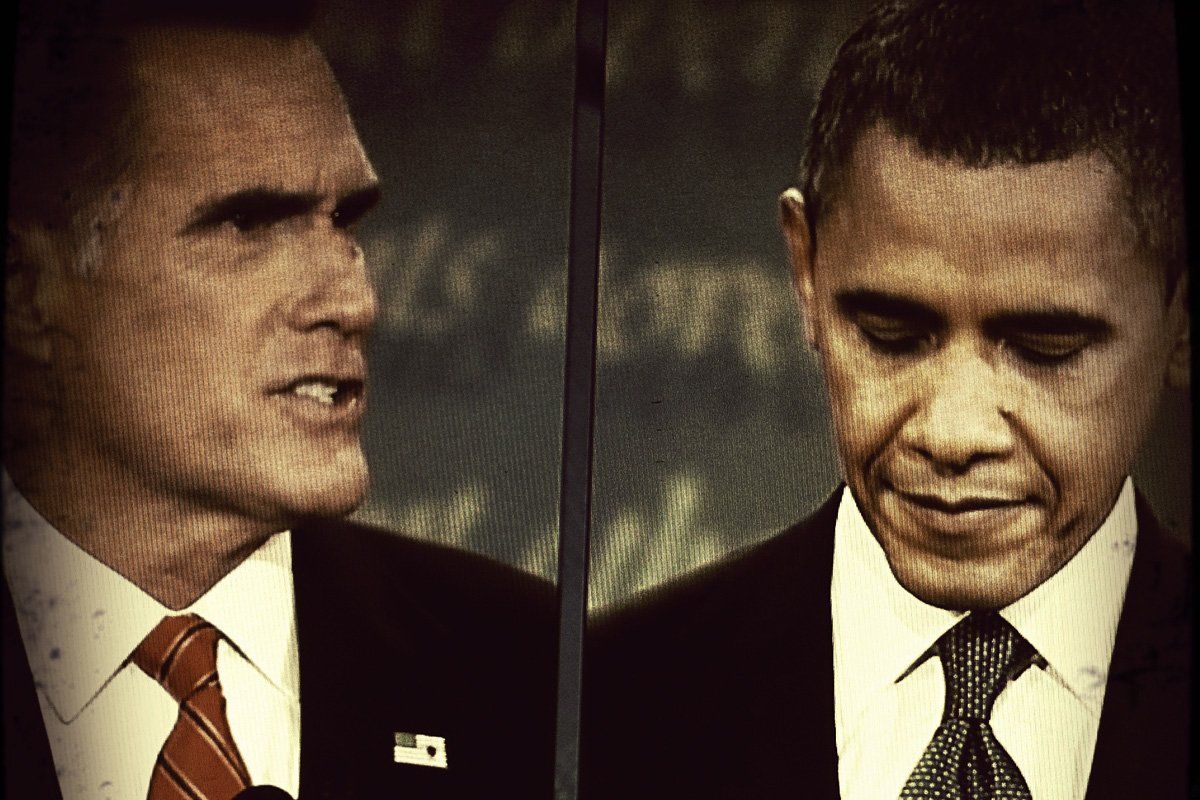
Which matters more: air power or boots on the ground? It's the kind of debate you hear a lot among military men and armchair strategists, arguing (these days) about how best to stop Iran from getting a nuclear bomb. Today, however, it's also a debate among the people who run election campaigns, arguing about how best to win their guy four years in the White House.
The air war is the one waged on television, and it extends far beyond the increasingly gladiatorial debates between the candidates. To live in one of the swing states is to live under an almost unceasing bombardment of political ads. By the time we finally make it to Nov. 6, it's estimated that all the campaigns, political-action committees, and super PACs will have blown more than $3.3 billion dollars on TV advertising, 83 percent of it local and about two fifths for the presidential race.
Even confirmed pol-aholics, like my friend and Weekly Standard editor Bill Kristol, have a shell-shocked air. Kristol lives in Virginia and likes watching baseball. Enough said.
There was a time when the spin doctors swore by air(wave) power. In this campaign, however, the pendulum may be swinging back to the traditional "ground game." According to a recent Reuters report, the Obama campaign has hundreds of field offices in swing states like Ohio and "hundreds of thousands" of people staffing them. The name of the ground game is to get the vote out. According to campaign manager Jim Messina's speech at the Democratic National Convention, his network of activists has made over 43 million calls and registered over 1 million voters, which is more than in 2008.
As in real warfare so in political warfare, the key to victory may lie in a combination of air and land power. First win the debates; then call up the base. Yet that is an oversimplification. For in politics, too, there is a new theater of war: the Internet.
Cyberwarfare is the new, new thing at the Pentagon. Defense Secretary Leon Panetta recently warned of the danger of "a cyber Pearl Harbor." Some would say something like that has already happened in politics. Four years ago, the Obama campaign comprehensively won the cyberwar against John McCain, out-emailing, out-blogging, out-tweeting, and out-YouTubing him.
This time around, the Democrats still seem to have the edge in cyberspace. Obama supporters dominate the blogosphere. More important, Obama's Chicago campaign headquarters is pioneering the use of "big data" and sophisticated quantitative techniques in order to target their ground game on the key voters. Pity the undecideds of Florida. Their phones are ringing off the hook, and their battered front doors will soon need to be repainted, if not replaced.
Impressive. Or perhaps not. Maybe all this hyping of the ground game is a sign that the Obama campaign is worried. They have good reason to be. Four years ago, black voters turned out in unprecedented numbers for the president. More than 55 percent of African-Americans under 25 voted, compared with 47 percent in 2004. Just under half of young white voters showed up, much the same as in 2004. The story was similar for voters between the ages of 25 and 44: for the first time ever, African-Americans were more likely to turn out than their white counterparts. In the key state of Ohio, black turnout was above 70 percent. There was also a big jump nationally in the share of young Hispanics and young Asians voting.
Why might such people be less enthusiastic about Obama today? The answer is clear. This recession has hit young people hard, and it has hit young African-Americans harder than almost anybody. Black unemployment is 14 percent, nearly double the white rate. Black household incomes have fallen twice as much. If anyone has reason to heed Mitt Romney's repeated criticisms of the first black president's economic record, it's his fellow people of color. They won't vote Republican. But, disillusioned, they may stay home.
People often argue that presidential elections are decided by money. If so, according to figures from opensecrets.org, Obama would win a second term—since he's raised 55 percent more money than Romney. Except that conservative super PACs have outspent liberal ones 2 to 1.
But elections are no more decided by campaign funding than wars are decided by defense budgets. Big bucks are necessary but not sufficient. This election is more likely to turn on the ways the rival campaigns deployed their dollars.
In just over two weeks' time, we'll know if Mitt Romney really won the war of the airwaves or if, after staking so much on their high-tech ground game, the Democrats succeeded in repeating their feat of four years ago—and mobilizing the unlikely voters.
Uncommon Knowledge
Newsweek is committed to challenging conventional wisdom and finding connections in the search for common ground.
Newsweek is committed to challenging conventional wisdom and finding connections in the search for common ground.
About the writer
To read how Newsweek uses AI as a newsroom tool, Click here.






